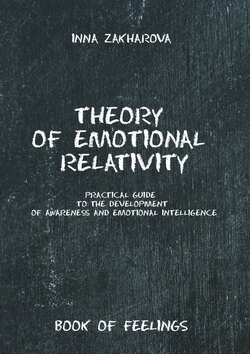Читать книгу Theory of emotional relativity. Practical guide to the development of awareness and emotional intelligence - Inna Zakharova - Страница 29
Shame
Shame. Processing
ОглавлениеShame is felt only in the moment. If the situation has passed, and you feel shame, it means that you reshape the situation inside yourself in secondary emotions. For example, you were at the school board and said some nonsense, the whole class laughed at you, the teacher looked down on you, you wanted to melt into the ground, run out of the classroom, forget about everything. When you were at the blackboard, you burned with shame, but when you came home, you no longer felt shame. If you remember a story and again burn with shame, it happens already in secondary feelings. Most often, the repeated shame that occurs in the memories, and not here and now, will be much higher in intensity than it was in the moment, because you wind it up. In the moment, we always live primary emotions (shame in this example), and at home, outside the situation, we process secondary feelings based on our beliefs, and it will be a completely different story.
Shame is actually an aversion to oneself; you don’t like yourself. You say to yourself: “You are not worthy expressing yourself, to be as you are, you must be some other.” This is the key issue. You can feel shame, as an emotion born in the moment in the current situation – this is a completely normal situation. But if you feel shame at the level of feeling that often haunts you in life, if it hurts you at the level of your inner convictions, it means that you have a problem, there is no love for yourself, you feel disgust with yourself.
When we see an object outside, towards which we are disgusted, we want to move away as far as possible, distance ourselves from it. How does this mechanism work with shame?
If you want to belong to a significant group (i.e., to reduce the distance as much as possible), you yourself move away from it because you feel shame and disgust with yourself. You do not push others aside “You are not worthy”, but push yourself aside “I am not worthy.” It means that you distance from society on the basis of your inner beliefs that something is wrong with you. And that can be a big problem. A person in need of love, with a basic need for acceptance and attention, distance himself and does not allow other people as he is afraid of feeling shame.
If there is no reason for shame in adequate reality (you are smart, well-read, you look decent and everything is fine with you), and you are too shy, afraid to show the products of your creativity to the world, you cannot convey your thought because of shyness, there is a high probability that you do not love, do not accept yourself, do not consider yourself worthy to belong to the group with which you are currently interacting.
And, of course, this will always be accompanied by an internal comparison, i.e. assessment. If you compare yourself with someone, it means that you constantly evaluate other people (bad/good, able/unable). It turns out that you demonstrate things from which you yourself constantly suffer in society. It cannot be that you are afraid of an external assessment, but you do not evaluate yourself. After all, you already have the focus of attention on comparison, it is important for you, it happens inside you. Such duality occurs very often.
